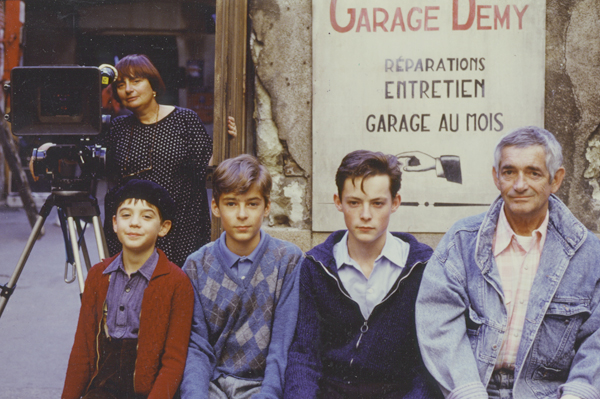Agnès Varda's supremely fond 1991 picture Jacquot de Nantes breaks with convention by opening with a list of the chansons that will fill our ears over the coming two hours. It's apt this discography should take the place of credits, because what follows proves to be both love song and lament: a tribute to a husband - director Jacques Demy, glimpsed in an early scene on one of Varda's signature beaches, sands passing through his fingers - who would eventually slip away from the filmmaker. (Demy died in October 1990 from AIDS-related complications, as Varda was finishing production.) The bulk of the film is Demy's memoir of what appears to have been a blissfully happy childhood in a working-class neighbourhood of Nantes as the Thirties gave way to the Forties. The most formative activity, however, takes place between the proscenium arches of the puppet theatres the young Jacquot delighted in attending, or in front of the windows at which Demy's neighbours danced and pranced; the initial impression is of a mind that, while tender and impressionable, was already beginning to frame everything it was taking in. Here are scenes that would later recur in Demy's own filmography, in one form or another. Snow White, whistling while she works, becomes inextricably linked to Demy's loving mère, who becomes the basis of Catherine Deneuve's princess in Donkey Skin; Demy père, meanwhile, becomes a model for the mechanic hero of The Umbrellas of Cherbourg. And throughout this most sentimental of filmmaking educations - even under the Nazi occupation - there is music, which likely goes towards Demy's interest in all things terpsichorean.
Scenes of actuality are shot in monochrome; any kind of escapism - whether Punch and Judy shows or school plays - vividly colourful. The two are joined in matrimony by a bravura editing conceit that is oddly reminiscent, two decades on, of those DVD special features that allow viewers to watch hidden or deleted material during the feature proper by pushing the appropriate button: clips from Demy's features come to be inserted within Varda's filmed memories. The technique would be jolting (alienating, even) were these extracts not so seamlessly integrated; real effort and care has been taken to return to the original exteriors wherever possible, and there are half a dozen or so of the most gorgeous, seductive match cuts in all cinema. Jacquot turning the crank of his beloved new camera rhymes with his mother, behind him (as ever), grinding coffee beans; the tangled roots of a cherry blossom tree, poking through a crack in the Demys' yard, cedes the screen to strands of hair on Jacques the elder's head. Varda strives to put on screen every fibre of her beloved's being, not out of some morbid fear of losing this man - the ever-ebulliant movies themselves act against that - rather to connect the dots between one Jacques Demy and another, and in so doing, to celebrate a life in word and image and song. This is one of the few memoir-movies, and memorial movies, that really does merit the adjective lyrical.
(May 2010)
Jacquot de Nantes returns to selected cinemas from Friday.

No comments:
Post a Comment